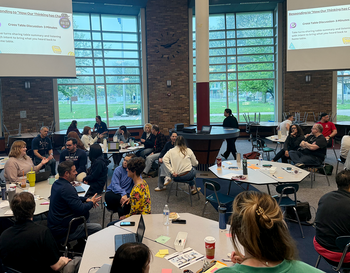Berkley Schools Hosts Professional Learning Day

On Tuesday, May 6, Berkley Schools held a Professional Learning Day, where staff participated in training designed to support their specific roles.
Elementary classroom teachers, learning specialists, and resource room teachers focused on learning the District’s new math program, Bridges in Mathematics. Staff learned about the District's overall vision for math instruction, explored how both teachers and students view themselves as math learners, and became familiar with the key parts of this new curricular resource.
Elementary special subject teachers (art, music, and physical education) and District Administrative Office staff took part in a workshop on Neuroscience-Backed Wellness. This training helped staff understand how the brain responds to stress and provided science-based strategies to manage stress and build resilience.
Media Specialists participated in Computational Thinking 101 training which provided an opportunity for staff to explore what computational thinking is and how computational thinking strategies can be applied across the curriculum through a variety of structured thinking activities. Media Specialists were excited to explore how they might incorporate these strategies into their instruction around literacy while incorporating technology.
Staff who work with grades 6–12 participated in a Secondary Showcase. The day began by discussing the book Grading for Equity, which explores fair and supportive grading practices. Afterward, staff attended breakout sessions led by Berkley Schools teachers, covering topics like using a 4-point grading scale, designing lessons that encourage student inquiry, supporting subject-specific reading and writing skills, and offering retake opportunities. Jen Wilcox, Supervisor of Instructional Services, said, “We are proud of our dedicated staff for their ongoing commitment to professional growth and are especially grateful to our Berkley Schools educators for sharing their expertise with colleagues.”
Special education staff participated in learning about Sensory Processing Fundamentals: Important Differences between “Breaks” and Sensory Integration Interventions. The session focused on enhancing knowledge of sensory processing and identifying activities that aligned with individual student needs. It aimed to deepen understanding of sensory regulation and the consistent use of supportive strategies throughout the District. Participants also learned to distinguish between general breaks and targeted sensory intervention strategies. By the end, attendees had at least one actionable idea to implement in support of student well-being.
Ms. Wilcox shared, “These learning opportunities help ensure that our staff are continuously growing and bringing the best possible experiences to our students every day.”





